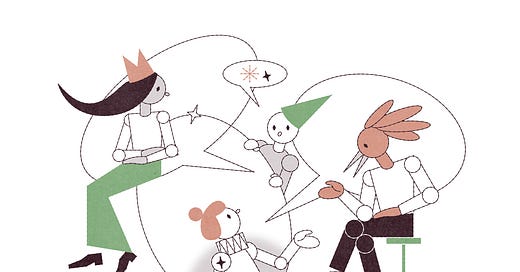Workshop your WIP: Crafting Relatable Characters
The Forever Workshop Community Corner — 3.19.25
Hey there, workshoppers.
This week’s Community Corner is inspired by the many wonderful story-starters and thought-provoking insights in Erin’s latest workshop — specifically, how to reveal the vulnerability and humanity in your writing:
“Taylor Swift has a rare - not unique, but rare - talent in that she can take a broad theme (relatability) and write with intimate details in a way that makes you feel like she is a) reading her diary aloud to you, and b) reading your diary aloud to you. She humanizes herself through her lyrics.”
— The Existential Questions at the Heart of Powerful Writing by Erin Karbuczky
Whether you’re writing about totally fictional people or telling your subjective truth in memoir or CNF, creating realistic, relatable ‘characters’ is vital, right?
A reader needs to think, “yeah, I can understand why this person did/said/thought that,” even if they don’t agree with them.
A perfectly ‘good’ character is kinda boring. At worst, they might even be irritating. No one goes through life without slipping up occasionally.
A thoroughly ‘bad’ character is two-dimensional. No one does terrible things without some kind of belief or reason or motivation.
So let’s talk about relatability, vulnerability and humanity in our writing.
Show Your Flaws:
Humans gonna human. For good or for bad. People make questionable decisions. People panic. People think they’re doing the right thing and make things worse. People can be utterly selfless and hideously selfish.
But this is what makes us so interesting. Especially when it comes to writing about all these foibles of humanity.
So here’s your Community Corner question for the week:
If you’re writing fiction:
What do you love about your characters? What makes them admirable, likeable, intriguing?
and
What are your characters’ flaws? Where is there room for them to grow, change, better themselves?
If you’re writing non-fiction or memoir:
What is the personal, perhaps vulnerable truth you’re trying to reveal to the reader?
and
What other perspectives challenge this truth? Can you see all the different sides of the story?
Share your thoughts with your friendly neighbourhood workshopping community!
And don’t forget to catch up with Erin’s Creative Process workshop if you haven’t already. It is full of great stuff (regardless of whether or not you’re a Swiftie).
On that note, let’s end with a wonderfully ‘flawed’ character in Taylor Swift’s Last Great American Dynasty which was based on the real story of controversial and unconventional heiress Rebekah Harkness:







I'll start with my main character's flaws, which all tie back to her being a teenage girl that grew up sheltered and repressed. She's desperate to find a group that she belongs to, but too green to understand the unspoken rules and expectations of this society she's been thrust into. Like most of us, she looks for validation externally, and that drives her to make some crappy decisions and hurt others.
Despite all of that, I love my main character's burgeoning sense of self (which has no blueprint), her curiosity about the world outside of her hometown, and also her secret sass/spunk that comes out when she's pissed off.
There are known flaws. These are flaws we know that we know. There are known unknown flaws. That is to say, there are flaws that we know we don't know. But there are also unknown unknown flaws. There are flaws we don't know we don't know...
The way I like to start flaw-building.